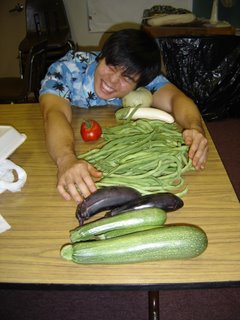I have learned that Santa, though ficticious, has a great job. [In commenting on Santa's apocryphal nature, I am referring only to the mythical person of Santa Clause, namely a "jolly", rotund white male of uncertain age (though figured as being well into his golden years) who lives at the North Pole (as if that were possible with global climate change and the melting of the polar ice caps), and, harnessing the power of aeronautically inclined reindeer, delivers presents to all the "good" girls and boys, while distributing coal to "bad" children, under the veil of darkness between Christmas Eve and Christmas Day. My comments are meant in no way to disparage or deny the existance of the historical figure of Saint Nicholas of Myra, who served as the Bishop of Turkey in the early fourth century.]
 On what basis to I declare the excellencies of Santa's imagined job? I have found great blessing and joy in bringing vegetables for friends to Wednesday night fellowship and Bible study. I feel like Father Christmas, filling the orders placed in advance to my brothers and sisters: Dora and Joy like green beans; Thomas loves home-grown tomatoes; Cecilia likes fresh basil; Elite loves zuccini, &c, &c. Shirley is even taking all of my left over squash and cooking it for our Friday social.
On what basis to I declare the excellencies of Santa's imagined job? I have found great blessing and joy in bringing vegetables for friends to Wednesday night fellowship and Bible study. I feel like Father Christmas, filling the orders placed in advance to my brothers and sisters: Dora and Joy like green beans; Thomas loves home-grown tomatoes; Cecilia likes fresh basil; Elite loves zuccini, &c, &c. Shirley is even taking all of my left over squash and cooking it for our Friday social.In some respects, my job is superior to Old Saint Nic's: I just give vegetables to everyone who wants them, without the moral quandry and of imperfect science of trying to determine who's been naughty and who's been nice. Since I'm not a world-renowned celebrity, I can go out in public without fear of harassment or the paparazzi. I am neither recognized at the mall nor beset with requests for toys and small electronic goods. I am not obliged to allow small children to cry, spill things, or pee on my lap for hours on end, while grumpy, hapless parents wait in line for the chance to let their children to torment me.
It's good to see how God is using my natural love of gardening to serve others and bring them homegrown happiness.
Moral of the story:
Yea, taking in is blessing sure,
This truth can't be denied;
But giving out is blessing pure--
With joy and bliss beside!
Beneficence makes wond'rous sums,
Imparting wealth galore;
You give, and give, and give, and yet
You're richer than before.
Now think upon God's charity:
We see, we breath, we live!
And fast imbibe this verity:
'Tis blessing all to give!
[Yes, I wrote these three stanzas in ballad form, but don't they sound very Longfellow-meets-Isaac-Watts?]
 (Third harvest of the season, from left to right: zuccini, Japanese cucumber, Fortex green beans, Kentucky Blue green beans.)
(Third harvest of the season, from left to right: zuccini, Japanese cucumber, Fortex green beans, Kentucky Blue green beans.)